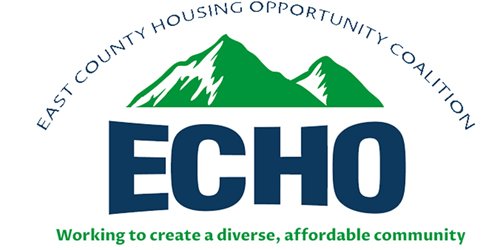Affordable Housing: Views of Candidates for the Town of Superior Board of Trustees, 2022

FACTS ABOUT HOUSING IN BOULDER COUNTY
About one quarter of renters in Boulder County spend at least half of their income on rent.
In some Boulder County departments, surveys show 70% of employees commute from outside the county.
Commuting into the county for work is most common among lower-income workers.
The last 10 years of available data show Boulder County has gained 3.5 jobs for every 1 unit of housing.
The Town of Superior has no permanently affordable rental homes or deed-restricted affordable homes.
42% of Superior residents are renters.
Rental housing that was unaffordably high-priced before the Marshall Fire is even more costly after the fire.
Each of the 2022 candidates for the Town of Superior Board of Trustees was invited to complete ECHO’s Affordable Housing Questionnaire. Their responses are posted below.
1. ECHO: Superior joined the other communities in the region and agreed to provide 12% affordable housing by 2035, So far, Superior has no permanently or deed restricted affordable for-sale or rental housing, and is one of the only places where there are no affordable units. How important do you think it is that Superior do it’s share to provide some of the region’s affordable housing, and how much of a priority will this be for you as an elected official?
MIKE FOSTER: I support the building of affordable housing in Superior to meet its commitment. I want to make sure it is integrated into the fabric of our community for all residential developments, not necessarily as stand-alone projects. Affordable housing means that all people have an opportunity to live close to where they work & play while offering a diversity of housing options for our teachers, retail employees and first responders.
2. What are the impacts on families when housing for younger workers is unaffordable in our area? Do you think this can be prevented through policy changes and/or funding? What do you see as the town’s role in that?
The Town needs to be part of the solution to affordable housing by looking for creative incentives to help these projects move forward. The Town could collaborate with non-profit affordable housing developers to pursue outside funding such as grants by offering staff time as a match or perhaps Town-owned land, if available.
3. Would you support a program to create accessory dwelling units that would remain affordable?
_X yes _____ no Why/Why Not?
Under the right circumstances, this could be part of the solution and I would be open to exploring this idea.
4. Would you support changing single-family zoning to allow more options for homes such as townhomes and duplexes on lots that have room for them so long as they met other code requirements? ____ yes ____no. As an elected official would you take a leadership role on this? ___ yes ___no
I would want to better understand the context and location of these proposed changes before offering a yes/no answer.
5. What do you think are the impacts to our community and our environment when the vast majority of workers commute from elsewhere? What role can affordable housing play in eliminating those impacts?
Commuting has an impact on the stress we feel sitting in traffic, wear and tear on our roads, contributes to air pollution and green house gas emissions from the burning of fossil fuels. Enabling people to live closer to where they work, reduces all of these impacts. Living closer to where one works also improves the quality of life for families.
6. The business community struggles to find workers because of the high cost of housing. Would you be willing to meet with business leaders to seek their support for affordable housing development in the town? _X yes ____no. Why or why not?
I’m willing to meet with any organization that is proposing solutions and potential funding pathways to these challenges.
7. Smart community development such as mixed-use, middle-housing, and transit-oriented development can have a significant reduction in greenhouse gas emissions. Would you support a scoring system so that proposed developments can be evaluated for their contribution to reducing greenhouse gasses? Would you take a leadership role in ensuring this becomes part of the planning process? ___yes_ ____no. Why or why not?
The LEED rating system, and elements of WELL Building Standards, already offers a scoring system for “green development” which includes points for proximity to transit, amenities and density of development. As a Trustee, I would strongly encourage all developments to maximize opportunities to pursue the highest level of LEED Certification possible and push development to certify at Gold level or above. The Town has aggressive greenhouse reduction targets and it needs developers to propose projects that help the Town achieve these goals.
8. What do you understand about our history that has led to people of color owning less property, and thus having less wealth than white people?
My understanding is that racism has contributed to this situation over several decades. Whether it was from banks refusing to loan people of color money to buy a home, or real estate agents refusing to show homes, has contributed to this issue. In addition, income and education gaps have played a role. According to a New York Times article, black workers make on average 20% less than white counterparts.
9. What do you think the town can do now to enhance equity as it relates to housing?
Following through on its commitment to affordable housing is one way advance equity in housing. A diverse community is a stronger community. I want to ensure that the community is involved in any affordable housing development within the Superior Marketplace and believe we need to pause that effort until more residents have finished rebuilding the homes they lost in the Marshall Fire.
10. Since most neighbors don’t want to change their neighborhoods, it makes it hard to build affordable housing. Should the people who are already here get a veto over expanding our community to include others, including those who work here or have family roots here, or to make our community more equitable? Please explain.
Elected officials are accountable to the voters and if the majority of people don’t want something, then the elected official needs to seriously consider what they are hearing. It is incumbent upon all residents to make sure their voice is heard on these important issues. Too often the “silent majority” sits by while a vocal few influence decisions. We need to re-envision the community engagement efforts when important issues are coming before the Town Board so that a broad spectrum of voices are heard. If elected, I would propose the following approach to development projects:
o Developer holds community meetings to share their goals, not designs, of their project and get initial input from community on its goals (e.g. walkable area, blends with the surrounding area, etc.)
o Developer holds another community meeting to present initial designs based on community input & developer needs – seeks additional community feedback on this initial design
o Developer then presents final design to community, then presents to Planning Commission for input, then finally Board input
o Taking this approach will help to ensure more voices in the community are heard.
11. Frequently, throughout Boulder County, the State and the Country, people who oppose affordable housing give other reasons for opposition, such as disturbing wildlife habitat, the wrong time, the wrong place, etc. Given that the town already has an affordable housing goal, that it is not achieving, how can we work with these residents who would prefer to stall, delay, or oppose affordable housing?
Superior is recovering from the worst disaster in State history. We need to focus on making it as painless as possible for those residents to rebuild. From the residents I’ve spoken with, they support affordable housing, but adding the community engagement efforts that accompany these types of proposals is too much to add onto what they are dealing with in terms of insurance and contractors, and we should slow this process down until more folks are back in their homes.
12. Recently after the fire, there has been evidence of price gouging by landlords taking advantage of a disaster. Do you think there should be a regulatory role for the town in stopping price gouging after a disaster? __yes ___no. Why or why not?
The Town of Superior has a very small staff, so I’d want to better understand what impact this would have on staff’s ability to meet its current obligations and what additional resources would be needed or what work would stop in order to enforce this type of new regulation. I certainly don’t want to see price gouging happening, but I also want to understand the extent to which this is happening before taking a unilateral position.
13. Do you see a role for Superior government in limiting vacation rentals and investor-owned property as a way of keeping housing costs down?
Before taking a position on this, I would seek to understand what percentage of homes in Superior are currently investor-owned and are vacation rentals. I want to make sure we are not seeking a solution in search of a problem.
14. Would you support lifting the state statute banning local governments from addressing high rents through rent stabilization measures of some kind? Are there incentives you think the town could provide to landlords who keep rents from skyrocketing? What might those be? Would you work to help create such incentives?
Based on my understanding and experience in communities that have put “rent control” in place, landlords lose an economic incentive to invest in their property. Superior is a beautiful community, so I would want to be very thoughtful on what, if any, rent stabilization measures look like. With the Town’s current budget projections over the next three years, many important and priority projects are getting deferred, so I would look to organizations outside of the Town to help create incentives until the Town is in a better financial position.
15. Do you support Proposition 123 which creates a funding stream for local governments to build affordable and attainable housing?
__X___yes _____no


